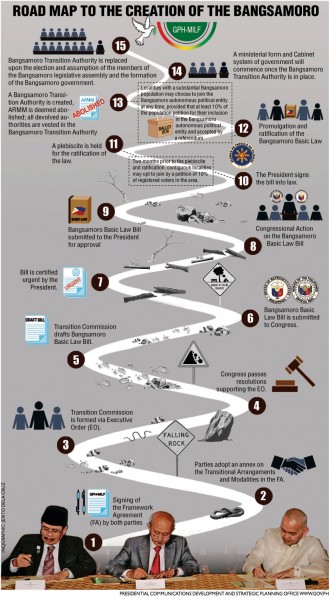
The Aquino administration and the Moro Islamic Liberation Front (MILF) have tentatively set for November the negotiations for the annexes of the comprehensive peace agreement.
Both sides want to finish the talks, which will resume next month in Kuala Lumpur.
“Starting from the announcement of the President of the framework agreement (on October 7), we have seen much goodwill generated. We hope that the goodwill generated by the signing will continue to flourish even as we go through details of the annexes,” presidential spokesperson Edwin Lacierda said in an interview.
“The reality is, we still have three issues to complete negotiations on, namely, wealth-sharing, power-sharing and normalization,” Mohagher Iqbal, MILF chief negotiator, told the Inquirer.
He said that for the MILF, “the framework pact already contains 90 percent” of the peace formula that the parties have committed to firm up.
Iqbal said this was the reason MILF chief Murad Ebrahim had referred to the framework agreement as “the most important document” in the almost 16-year peace negotiations.
Amid the euphoria of the signing of the accord that would set in motion a political solution to end 40 years of hostilities, President Aquino privately met with Ekmeleddin Ishanoglu, secretary general of the Organization of Islamic Cooperation, the world’s second-largest intergovernmental organization after the United Nations.
The meeting took place at Malacañang’s Music Room right after the signing of the accord.
Ishanoglu’s presence at the signing signified the Islamic world’s acceptance of the agreement, the Palace said.
Broad acceptance
At a Palace briefing Tuesday, the Inquirer asked whether there was a change in any of the statements issued, thus far, by Ishanoglu after he personally witnessed the “broad-based acceptance” of the deal with the MILF.
“I think the fact that the secretary general arrived to witness the signing and when he was invited he wholeheartedly agreed to witness the event, it’s a signal in and of itself,” Lacierda said, but declined to give details.
The 13-page framework agreement binds the “parties commit to work further on the details of the framework agreement in the context of this document and complete a comprehensive agreement by the end of the year.”
For this year, the government has committed P8.59 billion for the “Transition Investment Support Plan” (TISP), which is on top of the P12.93 billion already allocated through the national budget, the President said on Monday.
Transition budget?
Lacierda said that a whopping P21-billion budget announced by the President was not in any way related to the Transition Commission.
The 15-person Transition Commission—set to be created by Aquino via an executive order—is tasked to draft the basic law that will serve as a blueprint for a law to be passed by Congress legalizing the peace agreement.
Lacierda said that the P21-billion fund, including the P8.59-billion, was earmarked for the present Autnomous Region in Muslim Mindanao as its share of the national budget for 2012.
“(The TISP) will involve projects that can be fast-tracked, for instance, broad-based projects like electrification, seaports, fishing ports, slaughterhouses, day care centers,” he said.